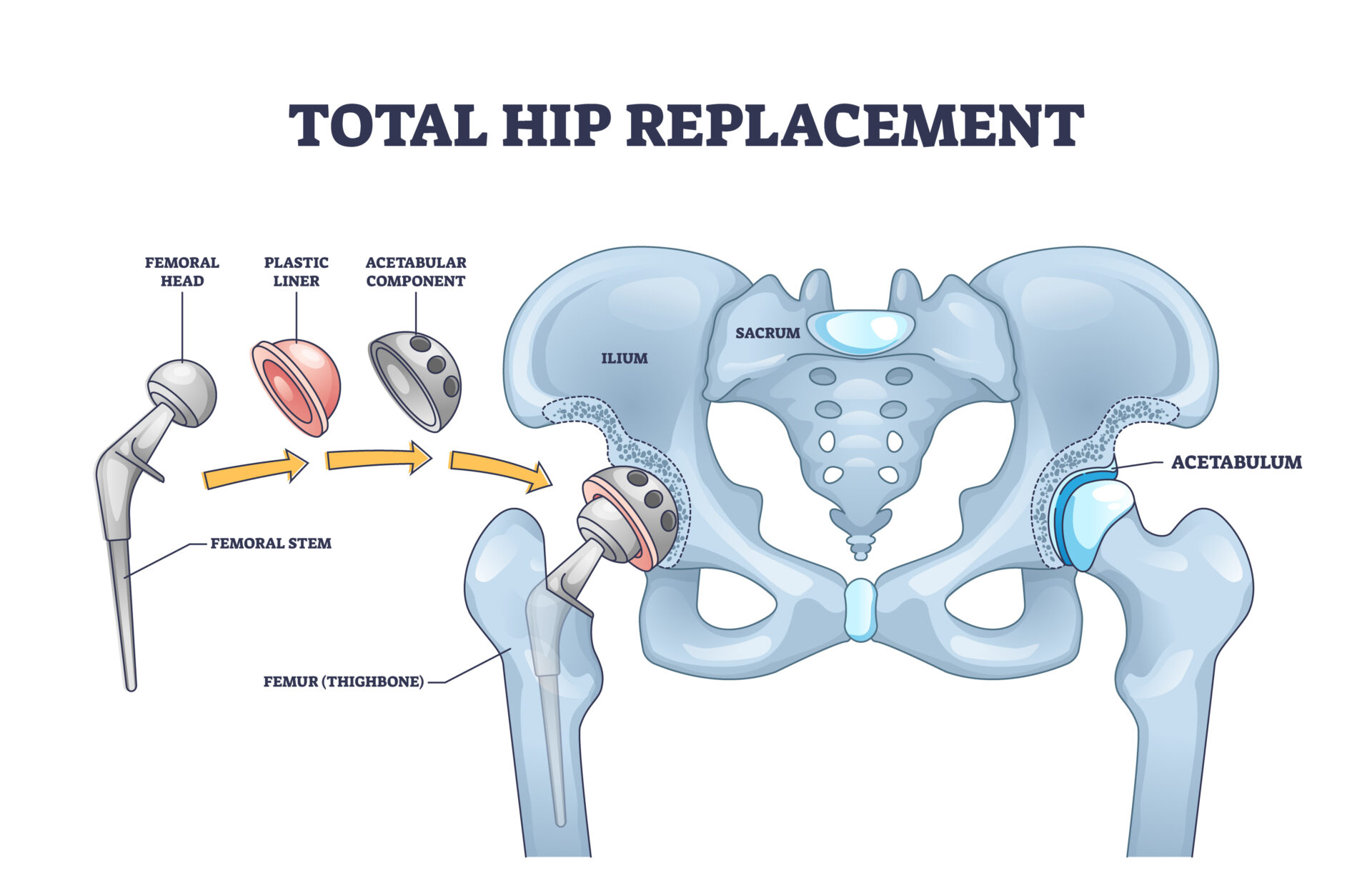Total hip replacement is a common surgical procedure for individuals suffering from severe hip arthritis or injury. This surgery involves replacing the damaged hip joint with an artificial implant to relieve pain and restore function. This comprehensive guide will help you understand total hip replacement surgery, including pre-surgery preparation, what to expect on the day of surgery, and post-surgery recovery.
About the Author: Joseph Tauro, MD, a Board-Certified orthopedic surgeon, is nationally recognized for his expertise in treating shoulder, sports, and degenerative joint disorders. As a professor at Rutgers Medical School and a Master Instructor for the Arthroscopy Association of North America (AANA), he leads the field in developing new techniques for minimally invasive joint replacement, arthroscopic shoulder surgery, and Augmented Reality surgical training. Patients from across the U.S. are referred to Dr. Tauro for his specialized care. Request an appointment with Dr. Tauro today to experience expert orthopedic care first-hand!
Anterior Approach Total Hip Replacement
Dr. Tauro almost always utilizes an Anterior Approach for hip replacement surgery. No muscles are cut using this technique and the chance of a postoperative dislocation is greatly reduced. You will not need any braces or pillows between the legs with an anterior hip replacement.

Pre-Surgery Guidelines for Total Hip Replacement
What You Should Do Before Hip Replacement Surgery:
Consultation with Dr. Tauro:
- Have a thorough discussion with your surgeon about the procedure, risks, and benefits of total hip replacement surgery.
Medical Clearance and Preparation:
- Obtain medical clearance from your primary care physician if required.
- Review all medications with your doctor. You may need to stop certain medications, like blood thinners, a few days before surgery.
Physical and Home Preparation:
- Engage in pre-surgery physical therapy or a home therapy program if recommended to strengthen the hip muscles before hip replacement surgery.
- Arrange your home to accommodate your post-surgery needs. This might include setting up a comfortable resting area and ensuring easy access to necessities. You may need a walker or crutches for assistance after surgery.
What You Shouldn’t Do Before Hip Replacement Surgery:
Eating and Drinking:
- Do not eat or drink anything after midnight before your hip surgery day. This includes chewing gum, which can produce excessive saliva in your stomach.
Smoking and Alcohol:
- Avoid smoking as it can impair healing and increase the risk of complications.
- Do not consume alcohol at least 24 hours before hip replacement surgery.

Day of Total Hip Replacement Surgery
What to Do on the Day of Surgery:
Arrive on Time:
- Arrive at the hospital or surgical center at the scheduled time. The surgery center will call you with that time generally the day before your hip replacement surgery.
Wear Comfortable Clothing:
- Wear loose, comfortable clothing that is easy to remove and put on.
Bring Essentials:
- Bring necessary documents and a list of medications.
What to Expect on the Day of Surgery:
Pre-Operative Preparation:
- You will undergo pre-operative preparations, including vital sign checks and anesthesia administration. Anesthesia will usually include a mixture of specialized local anesthetics placed in the surgical site to numb the hip as well as spinal anesthesia.
Surgery Duration:
- The procedure typically takes 1-2 hours, but this can vary depending on the complexity of the hip replacement surgery.
Post-Operative Recovery:
- After surgery, you will be monitored in a recovery area until the anesthesia wears off.
Post-Operative Care and Recovery After Total Hip Replacement
Immediate Post-Op Care:
- Almost all hip replacements are considered outpatient procedures. You may go home the same day or we may keep you overnight if your operation was done in the hospital. Regardless, we will have you out of bed and in a chair the day of surgery and walking with a walker or crutches the same day or the morning after the surgery.
- We DO NOT send patients to inpatient rehabilitation facilities as we feel infection rates are higher and care is inconsistent. You are much better off at home in a clean, comfortable and familiar environment.
- You will need to make sure a friend or family member is with you for the first 2 days after discharge.
- We will make arrangements for physical therapy in your home for the first week or 2 after surgery. You will be given a prescription for outpatient therapy after your first visits with us 1 week after your surgery.
Prevention of Blood Clots:
- Please take an 81mg “baby” aspirin twice a day for three weeks after your surgery.
- If you are on stronger blood thinners (such as Elaquis or Xarelto) you should restart them the day after surgery.
Pain Management:
- Expect some pain and discomfort, which will be managed with prescribed medications. With the regional block, there is usually minimal pain initially, which can be managed with Tylenol and ibuprofen afterward. When the local anesthetics we use after the surgery wears off a few days after surgery, pain may increase and you may need stronger pain medication which we will prescribe. Make sure the hospital or surgery center has accurate information about your pharmacy.
Brace and Crutch Usage:
- You will likely need crutches or a walker to assist with walking after knee replacement surgery. Weight bearing is usually permitted immediately and progression to a cane and ultimately no assist will take place as soon as your comfort and stability is achieved
Follow-Up Appointments:
- Schedule follow-up appointments with your surgeon, usually 1 week post-surgery. You can pre-schedule this appointment in our office before your hip replacement surgery.

Phases of Recovery After Total Hip Replacement Surgery:
Phase 1 (0-2 Weeks): Protection and Initial Healing
- Use crutches or a walker as directed.
- Engage in your home therapy exercises as prescribed by Dr. Tauro and your physical therapist.
- Full weight bearing is usually permitted. Ice on the hip incision can be helpful to reduce swelling.
Phase 2 (2-6 Weeks): Normalizing your gait
- Gradually increase mobility exercises under the guidance of your physical therapist.
- Isometric exercises and some light strengthening will be started by your physical therapist
- Focus on progressing to a cane or no assist if deemed safe by your therapist.
Phase 3 (6-12 Weeks): Strengthening
- Incorporate progressive strengthening exercises for the hip and surrounding muscles.
- Continue to avoid heavy lifting or activities that place excessive strain on the hip.
Phase 4 (3-6 Months): Functional Training
- Progress to functional and everyday activities as tolerated.
- Aim to return to normal activities gradually, following your therapist’s advice.
Full Recovery After Total Hip Replacement Surgery:
Time Frame:
- Full recovery can take anywhere from 4-6 months to a year, depending on the extent of the surgery and your adherence to the rehabilitation program. Most patients can return to activities like walking and light exercise at 6-12 weeks post-op
Rehabilitation:
- Consistent and dedicated rehabilitation is crucial for a successful outcome. Attend all therapy sessions and follow your doctor’s and therapist’s instructions diligently.

Frequently Asked Questions (FAQs):
How long will I need to use crutches or a walker after hip replacement surgery?
- Typically, you will need to use crutches or a walker for 2-4 weeks to support your hip.
When can I return to work after total hip replacement surgery?
- This depends on your job and the extent of your surgery. Desk jobs may allow a return within a few weeks, while more physical jobs may require several months.
Will I regain full range of motion and function after hip replacement surgery?
- With proper rehabilitation, most patients regain an excellent range of motion and hip function, though individual results can vary.
Total hip replacement surgery is a highly effective procedure for treating severe hip arthritis and injury. By following the pre-surgery guidelines, preparing adequately, and adhering to the post-operative care and rehabilitation phases, you can achieve a successful recovery and regain full function of your hip. Always communicate with Dr. Tauro and our team of orthopedic experts at AOSMI if you have any concerns during your recovery journey. If you are experiencing hip pain, are considering total hip replacement surgery, and would like a consultation, schedule an appointment with Dr. Tauro today!







